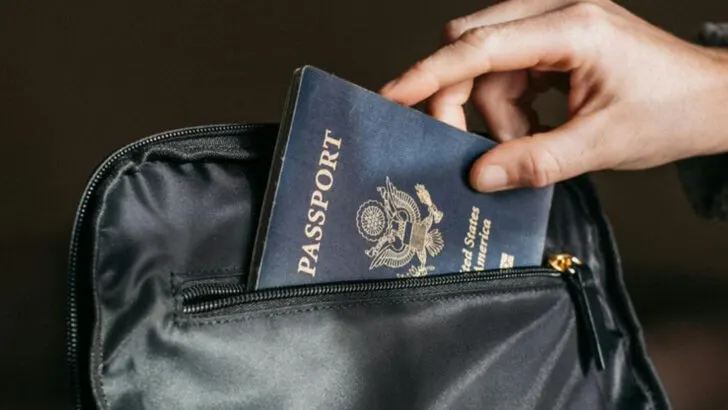Navigating the world of passports is more complicated than it seems. Many travelers are unaware of the nuanced rules that can impact their journeys.
Whether it’s about validity periods or unexpected visa requirements, these lesser-known details can make or break your travel plans.
Many Countries Require Your Passport to Be Valid for 6 Months Beyond Your Trip
Imagine planning the perfect trip only to be turned away at the border. Many countries have a rule that requires your passport to be valid for at least six months beyond your intended travel dates. This rule is enforced by popular destinations such as Thailand and Indonesia.
This means even if your passport seems valid during your travel dates, you may still face entry denial. This rule ensures that travelers will not face issues if their return dates are unexpectedly delayed.
It’s a precaution that protects both the traveler and the host country.
Some Passports Can Deny You Entry Based on Stamps from Other Countries
Stamps can be more than just travel mementos. For travelers to countries like Iran, Lebanon, or Kuwait, having an Israeli stamp can cause complications due to political sensitivities. Even visiting certain regions can affect your entry into other countries.
This is a relic of ongoing geopolitical tensions, making it crucial for frequent travelers to be aware of international relations.
Understanding these complexities can save travelers from unexpected detentions or refusals at immigration checkpoints.
Passport Pages Can Get You Denied Entry
Running low on passport pages might seem trivial, but it can lead to serious travel issues. Some countries need two or more blank pages for visas or entry stamps. Without enough pages, entry could be denied.
This requirement ensures that entry procedures can be completed easily, without complications. Always check page requirements before departing to avoid border headaches.
Replacing or renewing a passport with sufficient pages is essential for frequent travelers.
Damaged Passports Are Considered Invalid
A picture-perfect passport is essential for smooth travel. Even minor damage, like water stains or tears, can render a passport invalid. Airlines and immigration officials may refuse such documents, leaving travelers stranded.
This rule exists to prevent fraudulent alterations and ensures that all traveler information is clear and intact. Keeping your passport in pristine condition is vital.
Protect it with a cover or case to avoid unpleasant surprises at the border.
You Can Be Denied Boarding if You’re Too Close to Expiry
Airlines might refuse boarding if your passport is nearing its expiry, even if countries allow entry. Many enforce the six-month validity rule as part of their travel requirements.
This policy ensures that passengers aren’t stranded overseas due to an expired passport. It’s a measure for both traveler safety and airline compliance.
Always check your passport’s expiration date well ahead of travel to avoid last-minute issues.
Dual Citizens Must Use the Correct Passport
For dual citizens, entering and exiting a country with the correct passport is crucial. Many nations require that you use their passport when visiting, and failure to comply can lead to fines or entry denial.
This ensures proper record-keeping and adherence to national laws. It’s important for dual nationals to carefully manage their travel documents and entry requirements to avoid complications and potential penalties.
Some Countries Issue Emergency or Temporary Passports
Lost your passport overseas? Some countries can issue emergency or temporary passports. While helpful, these documents often come with limitations.
They might not be accepted by all countries or allow only one-way travel back home. Swift action is needed to replace lost passports, and understanding these limitations can prevent further travel disruptions.
Always contact your local embassy for guidance if you’re stranded without a passport.
Name Mismatches Between Passport and Tickets Can Cause Major Issues
Names matter. If your airline ticket doesn’t exactly match your passport name, it can lead to delays or denial when boarding. This includes middle names or initials.
Such mismatches can cause time-consuming corrections and even missed flights. It’s crucial to ensure that all travel documents align perfectly.
Review your tickets and booking information closely to avoid these preventable issues and ensure a seamless travel experience.
Some Countries Require a Visa Even for Airport Transits
Transiting through certain countries? You might still need a visa, even if you’re not leaving the airport. Countries like China, Russia, or Nigeria can require transit visas, especially if layovers are extended.
This can catch travelers off guard, leading to unexpected delays or penalties. Always check transit visa requirements for your layover countries to avoid surprises.
Proper planning ensures your journey remains on schedule, without legal hiccups.
Passport Photos Have Strict Rules—and Rejections Are Common
Getting your passport photo right the first time is crucial. Strict guidelines mean any errors, such as shadows or incorrect expressions, can lead to application rejections.
The meticulousness ensures clear identification and uniformity across documents. Double-check guidelines before submitting your photo to avoid processing delays.
Understanding these strict standards can save time and frustration in your application process.
Your Passport Number Can Change When You Renew It
Renewing a passport? Expect a new number. This change can affect travel plans if not updated with airlines or travel agencies.
This system ensures each passport is unique, aiding in identification and security. Keep track of these changes, especially when handling visas or international bookings, to ensure continuity in your travel plans.
Updating all relevant parties helps maintain smooth travel logistics.

